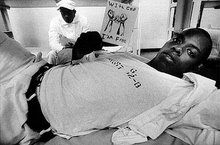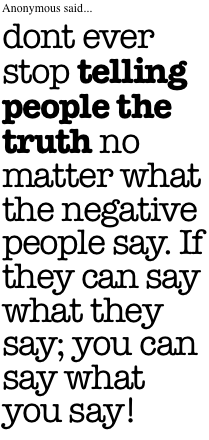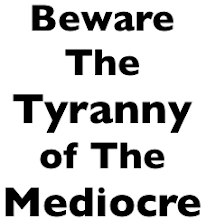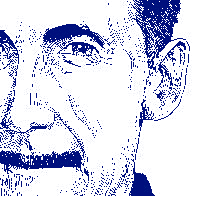 You have those three songs on the album that are inspired by your experience of being put in a Tallahassee jail for marijuana possession. What was that like?
You have those three songs on the album that are inspired by your experience of being put in a Tallahassee jail for marijuana possession. What was that like? SM: "Well, it was an experience still. I mean, it wasn't a great bad experience. It was an inconvenience. It wasn't justified, where they put us for this plant that we had. It wasn't justified, because I was behind bars with people that cut people's throats. And at the same time, I can go out to any bar on any given day and have as many shots of Jack Daniels and be as drunk as I want to be. So it didn't feel right, and it made me very curious as to why, really, do they fight this plant so much when it has so many different uses, you know?"
SM: "Well, it was an experience still. I mean, it wasn't a great bad experience. It was an inconvenience. It wasn't justified, where they put us for this plant that we had. It wasn't justified, because I was behind bars with people that cut people's throats. And at the same time, I can go out to any bar on any given day and have as many shots of Jack Daniels and be as drunk as I want to be. So it didn't feel right, and it made me very curious as to why, really, do they fight this plant so much when it has so many different uses, you know?"Have you found any answers to that question?
SM: "Mind control".
cnulan said...
 STARKLY alternative...,Depression is quite often treated by administering extra serotonin in the form of various dosages and types of antidepressants. Antidepressant drugs (Selective Serotonin Reuptake Inhibitors (SSRI's) like Prozac (c)) block the reabsorption of serotonin and allow it to stay in the gap. In so doing, it allows the serotonin to just keep smashing into the receptors across the gap, triggering them to fire at the receiving nerve cells again and again. Each serotonin molecule has a chance to transmit the signal across the gap by hitting a target receptor. If it fails to bind with the new recptor it is either destroyed or reabsorbed by the nerve cell that released it. Many times a patient will have to play the dreaded drug shuffle while finding a suitable antidepressant. This process takes a very long, long time. Research into depression found that the THC in Marijuana also works by prolonging the time the serotonin stays in the gaps between nerve cells. It increases the number of hits to target receptors by allowing the serotonin molecules to keep on shooting, mimicing the actions of the antidepressants.
STARKLY alternative...,Depression is quite often treated by administering extra serotonin in the form of various dosages and types of antidepressants. Antidepressant drugs (Selective Serotonin Reuptake Inhibitors (SSRI's) like Prozac (c)) block the reabsorption of serotonin and allow it to stay in the gap. In so doing, it allows the serotonin to just keep smashing into the receptors across the gap, triggering them to fire at the receiving nerve cells again and again. Each serotonin molecule has a chance to transmit the signal across the gap by hitting a target receptor. If it fails to bind with the new recptor it is either destroyed or reabsorbed by the nerve cell that released it. Many times a patient will have to play the dreaded drug shuffle while finding a suitable antidepressant. This process takes a very long, long time. Research into depression found that the THC in Marijuana also works by prolonging the time the serotonin stays in the gaps between nerve cells. It increases the number of hits to target receptors by allowing the serotonin molecules to keep on shooting, mimicing the actions of the antidepressants. Beneficial Side Effects of ingesting THC: In the ten years or so, scientists have discovered two receptors [CB1 and CB2] in the brain which are affected by the cannibinoids found in THC in marijuana. Ian Meng, a researcher at the University of California, San Francisco, is said to liken the relationship between these brain receptors and cannibinoids, to a lock and key. The receptors are on the nerve cell membrane and they're the lock and the cannibinoid, the key, opens this lock and unleash all of the nerve cells' actions. Meng discovered these actions
Beneficial Side Effects of ingesting THC: In the ten years or so, scientists have discovered two receptors [CB1 and CB2] in the brain which are affected by the cannibinoids found in THC in marijuana. Ian Meng, a researcher at the University of California, San Francisco, is said to liken the relationship between these brain receptors and cannibinoids, to a lock and key. The receptors are on the nerve cell membrane and they're the lock and the cannibinoid, the key, opens this lock and unleash all of the nerve cells' actions. Meng discovered these actions  include a process similar to the release of natural endorphins which results in pain reduction. THC can activate a very specific population of neurons to reduce the pain signal - just like the natural endorphins do. Investigations into the study of marijuana and serotonin showed that mental states such as depression are determined by the individual having too little serotonin. While the relationship is a very complex one, there is strong evidence that serotonin is involved in regulating human violence, aggressive behaviors, suicide, appetite and hunger. These actions have all been associated with reduced levels of serotonin in the brain.
include a process similar to the release of natural endorphins which results in pain reduction. THC can activate a very specific population of neurons to reduce the pain signal - just like the natural endorphins do. Investigations into the study of marijuana and serotonin showed that mental states such as depression are determined by the individual having too little serotonin. While the relationship is a very complex one, there is strong evidence that serotonin is involved in regulating human violence, aggressive behaviors, suicide, appetite and hunger. These actions have all been associated with reduced levels of serotonin in the brain.
















































































































4 comments:
1. Every human is born with instincts.
2. These instincts are regulated by brain mechanisms controlled by genes.
3. These genes come in different forms called alleles.
4. Some of these alleles are low in activity.
5. Low activity regulating genetic alleles turn out to be highly motivating and very low activity alleles cause addictions.
6. Both drugs and behaviors can serve as natural, instinct regulating, neurotransmitter substitutes.
7. Understanding how these genetic alleles work and the brain systems they work in may lead to a rational approach to addiction.
8. All drugs of addiction (and addictive behaviors) - and only these - ultimately stimulate dopamine release or increase its activity in the nucleus accumbens causing dopamine release throughout the brain to produce the hedonic response .
9. The hedonic responses to these addictors are:
I LIKE THAT!
a.)motivation
b.)incentive stimulus
c.)goal directed behavior(s).
10. Dopamine coordinates responses throughout the brain, especially the emotional and memory parts of the brain. It provides information about what’s important to the organism a well as feeling of well being.
11. Dopamine does all this in all people....,
Addictors stimulate dopamine release in nucleus accumbens and throughout the brain. Drugs that block dopamine block this response.
Marijuana produces starkly alternative ways of thinking. Criminalizing marijuana while allowing alcohol to remain legal - and even advertised on television -is unjustifiable. Though I no longer smoke, weed did open my mind up to new thoughts and a more perceptive way of looking at the world. When I was high, all I did was curl up in the bed and read books and I never knew what music really was until I smoked!
STARKLY alternative...,
Depression is quite often treated by administering extra serotonin in the form of various dosages and types of antidepressants. Antidepressant drugs (Selective Serotonin Reuptake Inhibitors (SSRI's) like Prozac (c)) block the reabsorption of serotonin and allow it to stay in the gap. In so doing, it allows the serotonin to just keep smashing into the receptors across the gap, triggering them to fire at the receiving nerve cells again and again. Each serotonin molecule has a chance to transmit the signal across the gap by hitting a target receptor. If it fails to bind with the new recptor it is either destroyed or reabsorbed by the nerve cell that released it. Many times a patient will have to play the dreaded drug shuffle while finding a suitable antidepressant. This process takes a very long, long time. Research into depression found that the THC in Marijuana also works by prolonging the time the serotonin stays in the gaps between nerve cells. It increases the number of hits to target receptors by allowing the serotonin molecules to keep on shooting, mimicing the actions of the antidepressants.
Beneficial Side Effects of ingesting THC: In the ten years or so, scientists have discovered two receptors [CB1 and CB2] in the brain which are affected by the cannibinoids found in THC in marijuana. Ian Meng, a researcher at the University of California, San Francisco, is said to liken the relationship between these brain receptors and cannibinoids, to a lock and key. The receptors are on the nerve cell membrane and they're the lock and the cannibinoid, the key, opens this lock and unleash all of the nerve cells' actions. Meng discovered these actions include a process similar to the release of natural endorphins which results in pain reduction. THC can activate a very specific population of neurons to reduce the pain signal - just like the natural endorphins do.
Investigations into the study of marijuana and serotonin showed that mental states such as depression are determined by the individual having too little serotonin. While the relationship is a very complex one, there is strong evidence that serotonin is involved in regulating human violence, aggressive behaviors, suicide, appetite and hunger. These actions have all been associated with reduced levels of serotonin in the brain.
Of course by now you've noticed that yet another introverted teenaged boy went buckwild with a high capacity firearm. Watch the media coverage closely, because the part that won't be discussed, but which ties together all these recent mass shootings is toxic chemical stew that this boy had been fed for the past several years.
While a state ward, he was diagnosed with attention deficit disorder, mood disorder, oppositional defiant disorder and parent-child relations problems.
Robert Hawkins, the 19 year old who killed himself and eight other people with an assault rifle last night in Omaha, Nebraska had a history of treatment with psychiatric drugs for depression and ADHD (Attention Deficit Hyperactivity Disorder) and was on prozac according to press reports.
Of course the headlines will once again focus on how evil and dangerous guns are, how the second amendment should be reevaluated and will once again ignore the fact that this young man was subject to dangerous brain altering chemicals for a number of years prior to this tragic incident.
Post a Comment